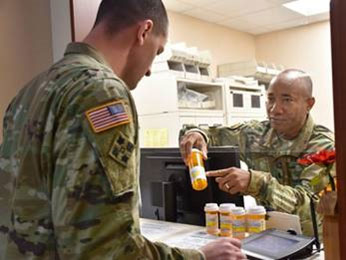Post-Traumatic Stress Disorder Drug Treatment (PTSD-DT)

Capability Summary: The PTSD-DT program delivers Food and Drug Administration (FDA) approved new drugs indicated for the treatment of PTSD, and/or improved Level-of-Evidence knowledge to inform clinician decisions for off-label use of FDA-approved drugs.
Impact: The U.S. forces are deployed to operational regions where there is significant risk of combat exposure, which may result in the development of PTSD symptoms. In total, more than 400,000 Service Members and Veterans have qualified for PTSD disability benefits, and an estimated additional 150,000 to 200,000 may be eligible.
Patient-level Data Analysis: Collection and analysis of patient-level data from a broad range of completed drug studies are ongoing to identify and better understand factors associated with active treatment and placebo response and non-response. Our goal is to assess the impact of variables of interest on PTSD symptom severity and other outcome measures to inform the design of our clinical trials.
The Clinician-Administered PTSD Scale for DSM-5 (CAPS-5) Study: Results of the "Psychometric Evaluation of the CAPS-5 and the PTSD Symptom Scale Interview for DSM-5 (PSSI-5) in an Active Duty and Military Veteran Sample" study will increase the probability of technical and regulatory success of future PTSD treatment development efforts. This study is evaluating the psychometric properties of the CAPS-5 assessment tool in active-duty military personnel and veterans and will compare the CAPS-5 to the previous gold-standard tool, the CAPS-IV. Biomarkers believed to be related to PTSD (e.g., biofluid biomarkers, cognitive and physiological markers, and neural activity as measured by electroencephalogram) are being collected to inform future targeted interventions in specific groups of patients and support other large-scale biomarker discovery efforts in the field. The study is being conducted in partnership with the Cincinnati Veterans Affairs Medical Center (CVAMC), Tripler Army Medical Center (TAMC), and Walter Reed National Military Medical Center (WRNMMC). Drs. Kathleen Chard (CVAMC) and Brian Marx (VA Boston Healthcare System) are the Co-Principal Investigators. Enrollment began in April 2019 at CVAMC, March 2020 at TAMC, and January 2021 at WRNMMC. Due in part to COVID-19, remote enrollment and assessments of veterans and active-duty service members have been initiated at the study sites, as well as additional Department of Defense (DOD) sites. In addition, due to slower than expected enrollment and determination that CAPS-5 would be the outcome measure used in future clinical studies, randomization into the PSSI-5 cohorts was discontinued in December 2021.
The Military and Veterans PTSD Adaptive Platform Clinical Trial (M-PACT): The Military and Veterans PTSD Adaptive Platform Clinical Trial (M-PACT) (NCT05422612) is an innovative Master Protocol clinical trial design that incorporates biological measurements to support a precision medicine approach to treatment and allows for the simultaneous and sequential testing of multiple drugs. The first four drugs to be tested on the M-PACT are fluoxetine, vilazodone, daridorexant, and SLS-002 (intranasal racemic ketamine). Up to 208 veterans and active-duty Service Members per cohort will be enrolled at approximately 20 sites (commercial, DOD, and VA) across the U.S. The first commercial site was activated in October 2023, and the first patient was screened in November. The results of the trial will identify drugs to move forward for Phase 3 testing to support a New Drug Application to the FDA or will support changes to clinical practice guidelines for the treatment of PTSD.













